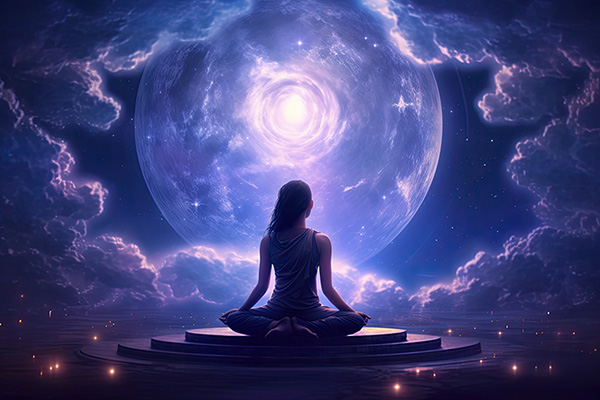culture
Embrace The Fall Equinox In Mind, Body And Soul
 As the vibrant colors of summer begin to fade and the air becomes crisper in the northern hemisphere, we stand on the threshold of the fall season of transition and transformation. It is a sacred time to prepare our minds, spirits, and bodies for the winter months ahead.
As the vibrant colors of summer begin to fade and the air becomes crisper in the northern hemisphere, we stand on the threshold of the fall season of transition and transformation. It is a sacred time to prepare our minds, spirits, and bodies for the winter months ahead.
Today’s autumnal equinox is a poignant reminder of the cycles of life and the eternal rhythm of nature. Steeped in ancient tradition and folklore, this celestial event occurs each year around September 21st and marks the point at which day and night are of nearly equal duration. Spiritually, it symbolizes equilibrium; a momentary pause in time between the warmth of summer and the cold of winter. It invites us to reflect on balance and harmony.
Ancient civilizations held a deep reverence for celestial events such as the autumnal equinox, which were often seen as significant markers of time and the cycles of nature. The traditional interpretations and beliefs surrounding the autumnal equinox varied from culture to culture, but they generally recognized its importance in agricultural, spiritual, and cultural contexts, and saw it as a time of transition, balance, and connection between heaven and earth.
In many agricultural societies, the autumnal equinox signaled the time of the year’s harvest. The ancient Egyptians and Babylonians celebrated this event with festivals and rituals dedicated to their agricultural deities. This often included feasting, music, and offerings to ensure a bountiful harvest.
Friends For A Reason, A Season, Or A Lifetime
 I recently reconnected with a family friend with whom I had a very close relationship about three decades ago. She was like a mother figure in some ways, even though she was only about 12 years older than me at the time.
I recently reconnected with a family friend with whom I had a very close relationship about three decades ago. She was like a mother figure in some ways, even though she was only about 12 years older than me at the time.
She is a very caring and nurturing person and was always there for me when my own mother was physically or emotionally unable. Her door was always open and she always had many people around her. After working in retail for many years, she changed careers to become a full-time caregiver, which she loved. After she retired and her husband passed away, she continued to be very active and had a very vibrant social life.
But during the Covid-19 pandemic, like many people her age, she experienced intense isolation and trauma. We spoke frequently on the phone during this time, and she was very much looking forward to the restrictions finally being lifted.
However, when the worst was over and most restrictions were lifted, her group of friends remained afraid to go out. Some of them even developed agoraphobia, a type of anxiety disorder that causes people to experience extreme, irrational fear of public places and unpredictable situations that they imagine could cause them harm, panic, or helplessness.
My dear friend was deeply affected by this. Seeing all her friends again was one of the things that kept her strong and hopeful through the chaos of the pandemic. But now she felt she had lost her tribe (beyond her family, who all have busy, demanding lives of their own and live several hours away). Fortunately, she is a determined soul who will not easily accept defeat and apparently she is gradually getting more of the old gang together for their usual fun meet-ups!
Follow Your Passion And Truth
 In Native American tradition, human existence and well-being is based on the Medicine Wheel, also known as the Sacred Hoop, that consists of the Four Directions, Father Sky, Mother Earth, and the Spirit Tree. Together these ‘spokes’ of the wheel honor all aspects of human existence, growth, balance, and well-being: physical, emotional, mental, and spiritual.
In Native American tradition, human existence and well-being is based on the Medicine Wheel, also known as the Sacred Hoop, that consists of the Four Directions, Father Sky, Mother Earth, and the Spirit Tree. Together these ‘spokes’ of the wheel honor all aspects of human existence, growth, balance, and well-being: physical, emotional, mental, and spiritual.
In each lifetime, we are destined to achieve progress in one or more of these areas until, finally, after many incarnations, all the ‘spokes’ of our wheel are complete – all the way from the inner hub to the outer rim. At that point, we have completed our various missions through many incarnations in a myriad of schoolrooms, and we finally achieve ascended mastery.
When all our spokes are complete, we leave this dense, earthly dimension and arrive at the highest plane of existence, the realm of the Great Spirit, traditionally known as the ‘Hunting Grounds of the Ancestors,’ and since the arrival of Christianity, as ‘Heaven.’
In this state we never need to descend again, and will remain infinitely in the higher dimension. We are liberated from the endless cycle of rebirth and reach a new level of consciousness and enlightened existence, known as nirvana in Buddhism, moksha in Hindusim, and eternal life in Christianity.
As a result, from a spiritual stand-point, we are offered a smorgasbord of options and choices that we may need for our particular journey in this lifetime. The enthusiasm and passion we feel when we are guided to a particular path is spirit directing us toward the ‘curriculum’ we need to complete in order to achieve our ultimate goal of transcendence in one or more spokes of our wheel.
From Fictional Self To Authentic Self
 A new concept that seems to be going around a lot lately in the spiritual community is to be your ‘authentic self.’ But what does this really mean? How do you know who your authentic self is? Heck, you may say, “I’m still trying to find out what my life purpose is, never mind who I truly am!”
A new concept that seems to be going around a lot lately in the spiritual community is to be your ‘authentic self.’ But what does this really mean? How do you know who your authentic self is? Heck, you may say, “I’m still trying to find out what my life purpose is, never mind who I truly am!”
Well, as a result of our education, our upbringing, our family dynamics, our job, and such, when we are asked the question “who are you,” we resort to answers such as: a mom, a dad, engineer, doctor, janitor. We tend to express our identity by what work we do, what credentials we have, and what society or our community has told us to be. We are bombarded by social, political, environmental and family expectations that can overwhelm us in modern life.
On top of this, the world today seems to be in chaos. There is distrust everywhere, and we have to contend with challenges like identity theft and social peer pressure. Yet, we are now also expected to know our authentic self? “God, help me, I don’t have time to look for that! I have the kids to take care of, work deadlines to keep, dinner and laundry to do, and I urgently need to sign up for an exercise program to reduce my weight!”
It is never ending, you say. Your authentic self is somewhere, you just don’t know where and no time to find it. But that is just the point! All these things we are expected to do are there because of the pressure we put on ourselves. As we look through our colored lenses of self-inflicted expectations and the social pressure we have learned from family or peers, we lose touch with who we really are, and what we truly want.
Reawaken Your Psychic Ability
 Many of us are born with the ability to perceive the unseen, sense the future and communicate with spirit. Childhood conditioning and trauma, religious and cultural influences in how we were raised, and various circumstances and life experiences can suppress our psychic gifts, often because we were told it is silly, inapproriate, or even ‘evil.’
Many of us are born with the ability to perceive the unseen, sense the future and communicate with spirit. Childhood conditioning and trauma, religious and cultural influences in how we were raised, and various circumstances and life experiences can suppress our psychic gifts, often because we were told it is silly, inapproriate, or even ‘evil.’
If you can relate to this, then you need to know that your psychic talent is never lost or destroyed. You can reconnect with your natural gifts by engaging in various spiritual and metaphysical practices that will reawaken and develop your psychic abilities.
I started this process myself years ago by experimenting with various forms of meditation. Meditation teaches one to achieve altered states of consciousness, to become more aware of perceptions and energies that we otherwise do not notice in our normal waking state.
I also started keeping a ‘psychic journal.’ I wrote down my dreams every morning, as well as any unusual thoughts and feelings I had about a person or situation. Using these notes as reference, I would later check the relevanc and accuracy of my perceptions and premonitions.
Studying various divination methods also helped me a lot. For example, Astrology helped me to better understand the ancient metaphysical concept of “as above, so below,” and how it affects our daily lives. Astrology references universal consciousness and divine design, and the direct affect it has on us. It gave me greater insight into why people born under certain zodiac signs behave the way they do, and how each planet affects us, especially when it retrogrades, or moves into a new sign. It also explains why people get more emotional when the Moon is full, or why communication breaks down when Mercury is in retrograde.
Gratitude Is The Essential Spiritual Practice
 In a fast-paced world with many distractions and challenges, it is easy to overlook gratitude’s transformative power. Cultivating a mindset of appreciation by acknowledging all the good in our life greatly enhances our well-being and quality of life.
In a fast-paced world with many distractions and challenges, it is easy to overlook gratitude’s transformative power. Cultivating a mindset of appreciation by acknowledging all the good in our life greatly enhances our well-being and quality of life.
Gratitude is advocated in many cultures, religious teachings, and spiritual traditions. It is generally considered the mother of all virtues and the essential spiritual practice. In Judaism, for example, gratitude is considered an essential part of worship. Islam encourages believers to be grateful and express thanks to Allah in all circumstances. Christians are encouraged to praise and give gratitude to God not just in thought and feeling, but also in deeds and action.
Gratitude is also a virtue that Hindus believe should be cultivated in order to live a fulfilling life of inner peace and contentment. Many Buddhist monks begin each day with a chant of gratitude for the blessings in their life. In fact, in Shin Buddhism, gratitude is seen as a primary practice that has priority over meditation and study.
In modern times, scientific research has shed further light on the profound benefits of having an ‘attitude of gratitude.’
While traditionally confined to the realm of philosophy, gratitude has garnered much attention in the field of positive psychology in recent years. Neuroscientists have also begun exploring gratitude from a scientific perspective, seeking to unravel the intricate workings of the brain when we practice and experience gratitude.
